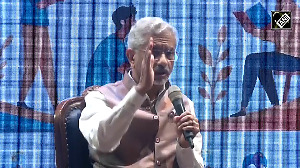Rediff.com's Tahir Ali reads behind the lines on Pakistan President Asif Ali Zardari's private pilgrimage to Ajmer Sharif and analyses the decline of Sufism in Pakistan
Questions have been raised over the visit of Pakistan President Asif Ali Zardari to India to pay homage at the shrine of Khwaja Moinuddin Chishti at Ajmer Sharif in Rajasthan, but the Indian government has dismissed the objections of opposing groups by terming the visit as a private pilgrimage.
In support of Zardari's visit, Prime Minister Yousuf Raza Gilani told his country's parliament that the president had long planned a trip to Ajmer to fulfil a mannat or vow made during his days of prison.
Mannat, one of the popular practices in Sufism, refers to a wish which when fulfilled is reciprocated by giving away money or food to poor people; or by visiting a shrine or any other religious place. What Zardari's mannat might be, only he knows better.
In Pakistan, Sufism is merely not a religious practice; it has played a crucial role in the politics of the country, especially in rural Sindh and Punjab. People in these areas blindly follow the orders of their respective Sajjada Nashin (descendant of a Sufi saint or descendant of a disciple of a saint) in their day to day life.
The Sajjada Nashin inaugurates the annual urs (ritual), which celebrates the saint's life and work. There was a time when faqirs (disciples) visited villages and towns to spread Sufism by chanting slogans of their murshid (spiritual leaders); they would listen to the problems of the people and would offer collective prayers to resolve the issues.
Likewise, the Sajjada Nashin also visited their respective areas once a year and inquired their followers about their problems. Today, most of the Sajjada Nashin have become part of Pakistani politics -- usually they visit the followers; not to resolve their issues but asking them to vote the candidates that the Sajjada Nashin favours.
Prime Minister Yousuf Raza Gilani, ex-foreign minister Shah Mahmood Qureshi and Pakistani Commerce Minister Makhdoom Amin Fahim are amongst the Sajjada Nashin sitting in Pakistani parliament.
Despite being labelled as Deobandis (anti-Sufism school of thought), the Sharif brothers visit shrines to fulfil their desires and to garner support.
In November 2007, when Nawaz Sharif and Shahbaz Sharif returned from exile they straight went to the shrine of Data Ganj Bakhsh in Lahore.
Slain wife of Zardari and former Pakistan prime minister, Benazir Bhutto too was a devotee of Data Ganj Bakhsh as well as of Shah Abdul Latif Bhittai, and Shahbaz Qalandar.
Bhuttos visited Ajmer Sharif in 1991, 2001, 2003 and 2005.
In 2003, Bhutto reportedly prayed for Zardari's release. During her last visit, when she was accompanied by Zardari, Bhutto offered prayers and thanked the mystic saint Khwaja Moinuddin Chishti for release of her husband. The couple also spent half an hour in solitude at the shrine.
Pakistan has remained one of the greatest seats of Sufism in the history of the sub-continent.
The pioneers of the 13th century Sufi movement in Pakistan were four friends -- Hazrat Fariduddin Masud Ganj Shakar of Pak Pattan (1174-1266); Hazrat Syed Jalaluddin Bukhari of Uch-Bahawalpur (1196-1294); Hazrat Bahauddin Zakaria of Multan (1170-1267) and Hazrat Lal Shahbaz Qalandar of Sehwan (1177-1274).
Besides these, the Pirs there have been a number of other Pirs in different parts of the country.
Although Punjab and Sindh lead in harbouring Pirs, but Khyber Pakhtunkhwa and Baluchistan have also remained under the influence of some saints and shrines.
Over the period of time, Sufism declined in Pakistan. At first stage, Tableeghi Jamaat (Deobandi) affected Sufism followed by the emergence of Wahabism and Salafism in 1980s.
The Wahabism came to this region during the Russian invasion of Afghanistan.
The Arabs not only came here to wage jihad inside Afghanistan but they also established seminaries all around Pakistan -- these madarassas launched a hate campaign against the Sufism.
The Arab-sponsored 'Wahabis' invested billions to build mosques and seminaries to preach their thoughts. Once the mosques were constructed, they made it conditional that the mosques would be run by their own imams.
These madarassas not only inspired Pakistani youth for jihad but also made them act against the Sufism. They termed Sufi music and poetry as decadent and immoral.
Wahabis threatened the Pirs and made their life miserable, as they were backed by the military regime of general Zia ul Haq.
Influenced by the Arab-imported Wahabism and Salafism, the Taliban emerged in Pakistan, playing havoc with the shrines and Sufi dargahs in tribal areas and Khyber Pakhtunkhwa followed by attacks on shrine across the country.
Shrines of Sufi saints Sheikh Nisa Baba and Sheikh Bahadur Baba were destroyed in Khyber Agency while the mausoleum Haji Sahib Tarangzai, a famous freedom fighter in Mohmand Agency, has been used by Taliban as their headquarters.
In the settled areas of KP the militants attacked the shrines of Hazrat Rehman Baba, Abdul Shakoor Malang Baba, Hazrat Abu Saeed Baba, Mian Umer Baba and Malang Baba in different parts of Khyber Pakhtunkhwa. The dargah of Hazrat Sayyad Ali Tirmizi, commonly known as Pir Baba in Buner, was locked.
When Taliban extended their attacks to Punjab and Sindh, the shrines of Data Ganj Bakhsh in Lahore and Abdullah Shah Ghazi Karachi and Baba Farid Ganj Shakkar -- the Sufi saints responsible for the conversion of the subcontinent's people to Islam -- were also attacked by the Pakistani Taliban.
Taliban 'war on shrines' continues in Pakistan. People have stopped visiting dargahs and other tombs of saints due to suicide attacks and other forms of attacks.
Sufism is on decline in Pakistan.
Apart from anti-Sufism forces like Tableeghi Jammat, Taliban, Wahabism and Salafism, fake and bogus Pirs have also damaged the image of Sufism in Pakistan.
The only role of Sufism that remains intact is the power of Sajjada Nashin, though it is used more for political gains that spiritual.









 © 2025
© 2025